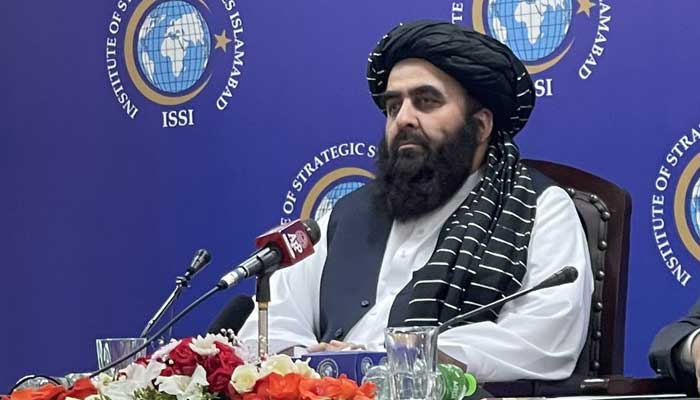- Afghan minister acknowledges Pakistan’s loss due to terrorism.
- Muttaqi urges both countries to show flexibility for “brighter future.”
- Says Taliban authorities have overcome multiple challenges.
ISLAMABAD: As terrorism in Pakistan continues to claim innocent lives, Afghanistan’s Acting Foreign Minister Mawlawi Amir Khan Muttaqi has urged Islamabad and banned militant outfit Tehreek-e-Taliban Pakistan (TTP) to sit together for a dialogue.
“It is requested that Pakistan and TTP sit together for dialogue,” the Taliban-led administration’s minister said while addressing an event in Islamabad on Monday.
Muttaqi is currently on a four-day visit to Pakistan to attend bilateral and trilateral dialogues during which, he mentioned, discussions around the region’s security situation were also held.
Pakistan’s anger has increased over the Taliban administration’s failure to reign in TTP which is behind a new wave of terror in the country. The security situation in Pakistan’s northern and southwestern provinces has worsened in recent months forcing the authorities to reiterate their commitment to eradicate the menace of terrorism.
Islamabad had held several rounds of talks — brokered by Kabul — with the outlawed TTP but the negotiations failed last year after which the militant group started terror activities.
Acknowledging Pakistan’s loss while fighting against terrorism, he said: “In the last 20 years, Pakistan has lost 80,000 lives to terrorism.”
The minister also spoke about Afghanistan successfully achieving peace after 44 years.
He added that the challenges faced by neighbouring countries Pakistan and Afghanistan are not different from one another. The minister said both countries have been through various situations and will now work together.
“Pakistan and Afghanistan will have to show flexibility and move towards a brighter future,” Muttaqi said.
Expressing Afghanistan’s interest in maintaining economic ties with Pakistan, the minister stated: “Pakistan has always been our focus. There has been interest in economic ties with the country since the beginning.”
The Afghan leader said trade between the two nations continued despite political differences and hoped to continue economic relations in the future.
Commenting on the significance of trade routes between the two countries, Muttaqi said: “Closure of trade routes eliminates several employment opportunities for ordinary citizens.”
Muttaqi suggested that bilateral progress can increase 10 times with Pakistan’s investment in Afghanistan’s energy reserves.
He added that both countries have been facing political and economic challenges for the last two years, but possess potential for growth.
“Many problems including livelihood and unemployment can be controlled by working together,” he said.
The Afghan minister also spoke about maintaining excellent ties with nations including Pakistan Iran, Turkey, Saudi Arabia and Qatar.
“We want to develop economic relations with Pakistan and Central Asia. Our foreign policy is based on dialogue and mutual relations,” he said, adding that their administration’s recent visits to Uzbekistan, Samarkand and Pakistan are an example of their good relations.
He termed the lack of economic ties with other countries as a “major challenge”.
He praised Pakistan’s efforts for economic prosperity and connectivity in the region. Muttaqi also said that Afghanistan’s relations with Pakistan are also on cultural and religious basis.
Speaking about the Taliban’s government in Afghanistan, the minister said: “It has been 20 months to our government in Afghanistan. Several problems have been overcome by the grace of Allah.”
Responding to a question regarding women’s participation in the workforce, the Afghan minister said: “Afghan women, 1,000 women health workers, are working in various fields including. They are also currently studying in different madrassahs.”


 Latest News3 days ago
Latest News3 days ago
 Latest News3 days ago
Latest News3 days ago
 Latest News3 days ago
Latest News3 days ago
 Latest News3 days ago
Latest News3 days ago
 Entertainment3 days ago
Entertainment3 days ago
 Latest News3 days ago
Latest News3 days ago
 Latest News3 days ago
Latest News3 days ago
 Latest News3 days ago
Latest News3 days ago























